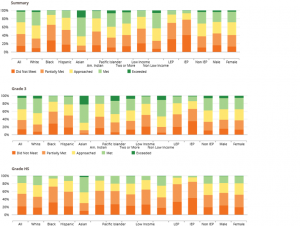(Adapted from an earlier post because this theme cannot be revisited too often.)
Government officials measure. They measure their measurements against past measurements. Then they reward school districts by leaving them alone or they step in with penalties. Today’s data-based approach always had more in common with tax accounting than education. NCLB led to test scores as THE measure of school quality. However. test scores taken out of context never begin to adequately tell the story of any school population.
In the meantime, educational administrators in “underscoring” districts do not and frequently cannot take a long-term view of the educational process because of those scores. These administrators and sometimes teachers may be anxiously trying to hold onto jobs that depend on elevating test scores. Our understandable, but too-often frantic, efforts to push up math and English scores take struggling districts for rides into the Twilight Zone, as administrators and teachers try to force inappropriate learning at students because “that’s what’s on the test.”
The faces behind the test numbers go unseen and unrecognized. Has a district doubled its English-language learner population? Have funding losses led to increased class sizes as teachers and paraprofessionals were laid off? Especially in poor districts, paraprofessionals are often too thin on the ground before lay-offs occur. Has a district been forced to cut back on tutoring? Are other interventions disappearing because of funding or staff losses? Is district technology breaking but only slowly receiving repairs? Are planning periods disappearing, supplanted by meetings designed to push up test scores? While crucial to understanding what is happening in schools today, no systematic accounting tracks the effect of learning loss from these pieces.
Too often, only final test scores are counted by state and federal government educational accountants, and that counting can easily skew instruction in suboptimal or even wrong directions. “It’s on the test” should not drive instruction. Our student’s background knowledge should drive instruction. I feel almost silly writing down such obvious truths.
Eduhonesty: U.S. students honestly might be better off if the NCLB legacy of high stakes annual testing disappeared.

